Organisational & Leadership Publications
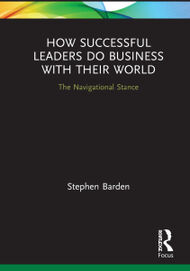
Publisher: Routledge
Author: Stephen Barden
ISBN 9780367564117
How Successful Leaders Do Business with their World
In this rigorously researched book Stephen Barden presents compelling evidence that top leaders learn from a very early age to 'do business with the world' by using their power and authority to partner with it, rather than impose themselves on it. Based on interviews with military, corporate and educational leaders, this book offers powerful insight into how these findings can be applied in practice.
The book illustrates how the assumptions leaders formed as children, and the way they learned to 'make space for themselves', directly links to the way they exercise their leadership as adults. Barden uses these findings and insights, as well as studies from his own corporate leadership career and coaching practice, to describe a set of common assumptions held by successful leaders. The book outlines several key concepts - the Navigational Stance, the Partnering Stance, the Oppositional Stance and the Navigational Compass - illustrates each with relevant examples and makes recommendations for applying these insights in practice.
This book will be a valuable asset for coaches, leaders, HR and L&D professionals, and all professionals working with leaders.
"I've always believed that the best organisations were 'learning organisations', that had a culture of self-reflection and candor and that had built-in processes for critical self-analysis...much like the US Army's AAR (after-action review) process. Stephen Barden has done a masterful job of explaining how to identify and develop leaders and managers who can create and lead such organisations. I wish I'd read his book when I was a young Officer instead of retired Officer!"
Lieutenant General (retd) Ben Hodges, US Army; Pershing Chair, Centre for European Policy Analysis; Partner, New Vista Partners; Advisory Board Member, Spirit of America
"This is an important book and one that deserves as wide a readership as possible. It should be mandatory reading for those preparing to assume positions of authority and responsibility. I have worked with Stephen Barden and have the greatest of respect for his experience and insight which he has distilled into a highly readable and engaging book. It made me smile and it also made me squirm as I recognised many of my own failings in the examples."
Major General (retd.) Colin Boag, British Army (CB, CBE, Officer of the Legion of Merit, US); Managing Director, the Mount Stuart Trust Stephan Barden interview.
Stephan Barden interview
https://www.youtube.com/watch?v=zl1YGl3wxvM
This book is available directly from the publisher.
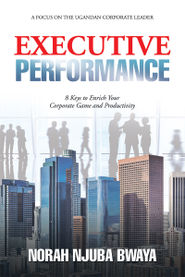
Publisher: Xlibris
Author: Norah Njuba Bwaya
Published: 2017
ISBN: 13–Digits Hard copy: 978-1-5434-3975-5
Soft copy: 978-1-5434-3974-8
eBook: 078-1-5434-3973-1
Executive Performance: 8 Keys to Enrich Your Corporate Game and Productivity - A Focus on the Ugandan Corporate Leader
It is one thing to write a theory and quite another to adduce gems of wisdom from a calling that was lived in numerous settings, explored over decades, and then studied. Such is the case for Dr. Norah Njuba Bwaya’s Executive Performance.
This book includes lessons from the author’s lived working experience of more than two decades, and views from a reflective and critical research on executive performance in Uganda. It presents a framework of eight critical pillars of executive performance and a model for generating intrinsic motivation to perform. In this book, Bwaya illustrates that performance is mostly about leadership, sociocultural beliefs, and the performer’s attitudes. More importantly, she presents a practical guide about leadership that appropriately addresses specific sociocultural and mind-set challenges to unlock performance among Ugandan executives.
Three words describe this treatise: passion, experience, and depth.
In here are invaluable thoughts, nuggets, and incredible wisdom for organization leaders, entrepreneurs, and corporate executives who are looking for ideas to enhance organizational performance in an African setting. This book is a must for anyone who cares about leaders’ performance; indeed, Executive Performance is a collector’s piece.
Prof. S. Nannyonga-Tamusuza / Head of Dept. Performing Arts & Film, Makerere University, Kampala
To purchase book Click HERE
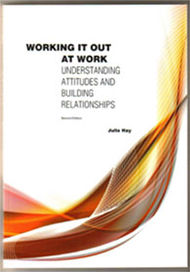
Publisher: Sherwood Publishing
Author: Julie Hay
Published: 2009
ISBN: 10-digit: 1907037016 (pb)
ISBN: 13-digit: 9781907037016 (pb)
Working it Out at Work: Understanding Attitudes and Building Relationships 2nd edition
Do you need to work well with other people; are you curious about the games people play; are you keen to learn new approaches and skills? This book explains why relationships at work are sometimes so difficult; describes frameworks for developing self awareness, flexibility and confidence; contains plenty of practical suggestions for increasing relationship and team building skills; and includes specific ideas for handling stress and change.
Julie Hay has taken models used by psychotherapists worldwide, converted them into terms that can be easily understood by all of us, and related them specifically to what happens at work. Drawing on examples from a broad spread of organisations, she shows how we can use these theories to interpret the dynamics between people and make better choices about our responses. To help us expand our range of options, Julie takes us gently through some self-awareness activities so that we can eliminate unhelpful patterns from our past and replace them with resourceful new ways of thinking, feeling and behaving.
This edition has been updated to include several of Julie’s developments of the models, which now place even more emphasis of the positive psychology of Transactional Analysis (TA).
After more than 45
years experience as an employee, supervisor, manager, trade unionist, trainer
and consultant, Julie is able to draw her examples from industry, the public
sector, local and central government.
She is an internationally – accredited expert who has taught TA for over
25 years in Europe, Australasia, India, Asia, North, Central and South
America. With Julie’s knack of making
the complex seem easy, this book is full of ideas for getting the benefits of
TA in the workplace.
This book is available directly from the publisher.
To purchase this book:
Click here / http://www.sherwoodpublishing.com/ta-books-and-dvds1.html
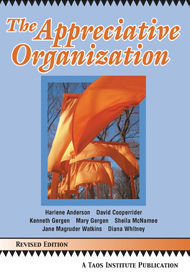
Publisher: Taos Institute Publications/Focus Book Series
Author: Harlene Anderson, David Cooperrider, Ken and Mary Gergen, Sheila McNamee, Jane Magruder Watkins and Diana Whitney
Published: 2008 Revised Edition
13-digit: 9780971231276
The Appreciative Organization
In the original version of this book the founders of the Taos Institute pooled their substantial resources to create a vision of a powerful and humanly nourishing form of organization and to share practices for bringing this organization into being. Today, The Appreciative Organization has been revised and updated. Based on the authors' diverse experiences in organizational life, they are unanimous in their view that the appreciative construction of meaning is essential to the efficacy of an organization and the fulfillment of its participants.
In clear and direct language, the volume treats the challenges of decision making, leadership, group functioning, personnel evaluation, and the relationship of the organization to its context. Bold ideas are developed, examples described, and multiple suggestions developed for creating the appreciative organization.
The revised edition of the book builds upon the ideas, concepts and characteristics of the Appreciative Organization. Now included in the book is a section on helpful resources, a chapter on “valuationâ€, and much more. You will want to add this new “gem†to your personal library. This volume will be of special significance to consultants and organizational members who wish to see the key elements of appreciative inquiry realized in the everyday working of the organization.
“This book is meant to be a brief intro to the concept of Appreciative Organizations from two complementary approaches: Social Constructionism and Appreciative Inquiry. It turns out to be a powerful insight to a new form of conceiving organizations. Shared co-created meaning appears to be crucial for organizations trying to engage people to survive and grow in a vastly changing environment. And appreciative interchange seems to be the most powerful tool for generating life and value for the organization. To me, this book is a must for those who struggle for new and effective ways to understand and develop organizations, facing 21st century.â€
Carlos Aguilera, Santiago, Chile
This book is available directly from the publisher.
To purchase this book: Click here
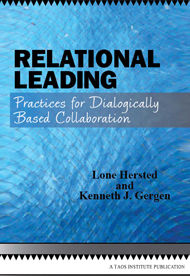
Publisher: Taos Institute Publications/Taos Tempo Series
Author: Lone Hersted and Kenneth J. Gergen
Published: 2013
13-digit: 978-1-938552-06-9
Relational Leading - Practices for Dialogically based Collaboration
The focus of this book, Relational Leading, is on how the vitality and viability of the organization rely on communicative practices. In contemporary world conditionswhere rapid flows of information, ambiguity, and risk prevailrelational process becomes pivotal. New practices of leadership are required, most significantly, skills in dialogue.
After sketching the emergence of relational leading and key concepts in dialogue analysis, the book provides a rich range of practical dialogic challenges. The authors work with the reader in deliberating on “best practices,†thus sharpening the reader’s consciousness and preparing him or her for efficacy in relational leading.
“Hersted and Gergen have written a book that we need now more than ever. With all the literature on the qualities of strong leaders including recent interest in mindful leaders, we have fallen prey to a limited view of leadership as an individual character trait or skill. Focusing instead on collaborative practices and coordinated meaning, Relational Leading is a game changer. When we realize that the art of leadership is the art of dialogue as Hersted and Gergen illustrate here, we will have re-discovered fire.â€
Frank J. Barrett, Author of Yes to the Mess: Surprising Leadership Lessons from Jazz Improvisation, Harvard Business Review Press, 2012
This book is available directly from the publisher.
To purchase this book: Click Here
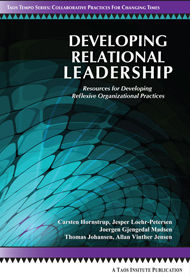
Publisher: Taos Institute Publications/Taos Tempo Series
Author: Carsten Hornstrup, Jesper Loehr-Petersen, Joergen Gjengedal Madsen, Thomas Johansen, Allan Vinther Jensen
Published: 2012
13-digit: 978-0-9819076-9-7
Developing Relational Leadership: Resources for Developing Reflexive Organizational Practices
Taos Institute Publications is thrilled to offer this innovative
book which has been translated from Danish to English. The authors
share a wealth of experiences working with leadership and change in
organizations.
“Developing Relational Leadership offers the scholar, the
practitioner, and most importantly, the scholar-practitioner an
exuberance of riches. The authors provide a deep foray into the worlds
of systemic, cybernetic and constructionist ideas, while bringing those
ideas to the worlds of leadership and organizational change and
practice. The authors share cases that present tools for exploring
these ideas and practices.
While the authors position the two halves of this volume as “tools for
thinking†and “tools for action,†marking this as a book about both
theory and practice, the reader experiences “tools for thinking about
the relationship between thinking and action†and this connection is
quite a treat. Relationship and context are continually in the
foreground.
Developing Relational Leadership looks at the importance of the
questions that we ask and what our questions do for systemic inquiry
and praxis. The focus on diverse ways of asking powerful questions is
worth the read itself.
This book is for those who are interested in systems theory,
cybernetics, constructionism, and communication theory, as well as
those interested in leadership, coaching, and organization development.
The authors, true to their reliance on positioning ourselves in a
multitude of roles, invite us to converse with an ecology of ideas, and
open space for a profound reflective practice. A joyful read that will
change how systems practitioners think and systems theoreticians act.â€
Fredrick Steier, University of South Florida
This book is available directly from the publisher.
To purchase this book: Click Here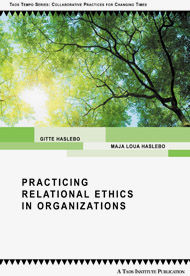
Publisher: Taos Institute Publications/Taos Tempo Series
Author: Gitte Haslebo, Maja Loua Haslebo
Published: 2012
13-digit: 978-0-9819076-8-0
Practicing Relational Ethics in Organizations
In unforeseeable ways, events in organizations can lead to loss of face, violations of personal dignity, damaged relationships and poor results. Managers, employees and consultants search for ideas that might help them deal with complicated situations in morally respectful ways.
By telling nine dramatic real life stories the authors
illustrate how managers, employees and consultants might find
inspiration in key social constructionist concepts and relational
ethics. They introduce and unfold five key moral obligations in
relational ethics: social responsibility, dialogic obligations, shared
responsibility for positioning, inquiry of value to the work community
and the obligation to interact as morally responsible agents.
“Practicing Relational Ethics in Organizations is a
wonderful book and I recommend it highly. It moves forward the
discussion about ethics in organizations within a social constructionist
perspective. Beautifully written and a delight to read, it provides an
opportunity for English-readers to see how familiar ideas are being
developed and practiced in a less familiar social, political, and
institutional context, and most importantly, from my perspective the
authors succeed in inscribing their wisdom and humanity. The book shows
how we can make relational ethics support our being human in
organizations.â€
W. Barnett Pearce, Professor Emeritus at Fielding Graduate University, California
This book is available directly from the publisher.
To purchase this book: Click Here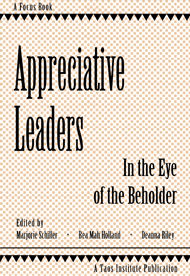
Publisher: Taos Institute Publications/Focus Book Series
Author: Marge Schiller, Bea Mah Holland, and Deanna Riley
Published: 2001
10-digit: 0-9712312-0-6
13-digit: 978-0-9712312-0-7
Appreciative Leaders: In the Eye of the Beholder
This 200-page volume presents a model of Appreciative Leadership based on twenty-eight interviews, fifteen of which are included in the book. This small but comprehensive sample reveals the outstanding characteristics of appreciative leaders and their predominant behavioral attributes. The ways appreciative leaders engage in their daily practices are outlined in detail.
“This is a landmark book,†according to Jane Watkins, an originator of Appreciative Inquiry. “It is an invaluable contribution to the literature that addresses the critically important question: What kinds of leaders will shape the radically different organizations called for by our constantly changing environment?â€
Appreciative Inquiry leader, David Cooperrider writes, “Appreciative modes of management may be to our new self-organizing systems what deficit or problem-oriented methods have been to command-and -control bureaucracies.â€
“In this very readable book the editors present the theory and practice of Appreciative Inquiry (AI) for the practitioner to immediately use. The fruitfulness and promise of AI come to life in the unfolding stories from a wide range of organizational fields frame.
The sections on the AI Principles provide one of the strongest explanations of what the Principles are, how they work, and how they relate to the research. The editors thorough descriptions and explanations of the principles establish a foundation for making them more meaningful.
The Appreciative Leader is a must have book for
your AI library! This book sets the big picture of leading through
appreciative inquiry. As a high school principal this book set me on my
journey of intentional Appreciative leadership and an affirmation of
my leadership strengths. I just wish that I had discovered it earlier
in my career and met sooner the colleagues who are also on the same
journey.â€
Dr. Elaine Sullivan
This book is available directly from the publisher.
To purchase this book: Click Here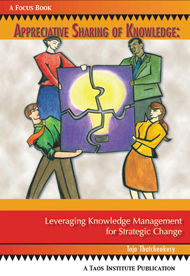
Publisher: Taos Institute Publications/Focus Book Series
Author: Tojo Thatchenkery
Published: 2005
10-digit: 0-7880-21-37-0
13-digit: 979-0-7880-2137-3
Appreciative Sharing of Knowledge: Leveraging Knowledge Management for Strategic Change
True knowledge sharing in organizations occurs less regularly than most of us think. What can be done to help create a system in which people share the internal "know-how" unique to each organization? In this contribution to change management, Tojo Thatchenkery describes a brand new methodology called Appreciate Sharing of Knowledge [ASK] and provides a step-by-step tool kit for anyone interested in knowledge management.
Using the most recent research, Thatchenkery shows how "appreciation" is the missing link in facilitating knowledge sharing. By systematically and intentionally creating an appreciative climate in organizations, leaders and practitioners can deal with change with least resistance and leverage the "tacit knowledge" that is essential for competitive advantage. Written in lucid, jargon-free language, this book is a must-read for anyone interested in the most recent approaches to dealing with change and creating a robust knowledge management architecture in organizations.
“I just completed your new book on Appreciative
Sharing of Knowledge over the weekend. As an independent consultant, I
read lots of books about management, organization and change. Only a
few have inspired me as much as this one has. You have really nailed a
wonderful application of Appreciative Inquiry in such a beautifully
practical way. Thank you so much for writing this book. I am already
exploring the possibility of using this approach with a potential
client.â€
Debbie Morris, Performance by Design Consulting, LLC
This book is available directly from the publisher.
To purchase this book: Click Here
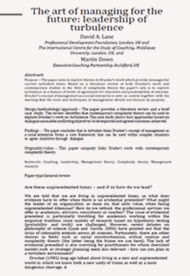
Author: David A. Lane & Martin Down
The Art of Managing for the Future: Leadership of Turbulence
Management Decision Vol. 48 No. 4, 2010
(pp. 512-527)


